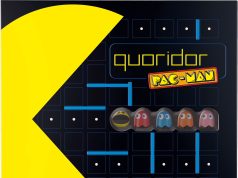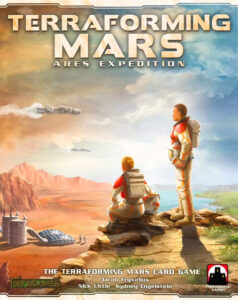 Earth-bound humans have long been fascinated Mars, our nearest planetary neighbor (editor’s note: this is not actually true. Andrew is not much of an astronomer). And a lot of great things have resulted from this fascination. Among those, thanks to a lot of human ingenuity and amazingly smart people, we’ve managed to launch a rover from Earth and land it on the surface of Mars over six months later. That’s pretty incredible and could just be key in humanity’s long-term survival.
Earth-bound humans have long been fascinated Mars, our nearest planetary neighbor (editor’s note: this is not actually true. Andrew is not much of an astronomer). And a lot of great things have resulted from this fascination. Among those, thanks to a lot of human ingenuity and amazingly smart people, we’ve managed to launch a rover from Earth and land it on the surface of Mars over six months later. That’s pretty incredible and could just be key in humanity’s long-term survival.
But don’t forget other Mars-related things that have contributed to humanity. Marvin the Martian. Mars Attacks! That Matt Damon movie where he grows potatoes. And of course, for us board gamers, Terraforming Mars. Currently the 4th highest ranking game ever on BoardGameGeek, it’s become one of the go-to examples of “heavy eurogames” that has reached a broad audience in the hobby gaming world. Its success has also resulted in expansions and fancy upgrades. But it also launched Ares Expedition, a game set in the same world, Mars obviously, but with some different mechanisms and a mostly different feel.
Gameplay Overview:
If you’ve played Terraforming Mars, you’ll understand the theme of Ares Expedition right away. Players take the role of corporations whose job is to raise the heat and oxygen level of Mars while also making some room for a few oceans. Once you’ve done that the game ends and whoever’s company is adjudged to have terraformed the best is the winner.
However, there is no map of Mars to place a lot of fancy tiles on. Instead, you’ll be using cards to take actions and score points. There is a small board to indicate when oceans are built but they simply serve to give you a small bonus when placing an ocean and there isn’t any area control or placement decision to be made.
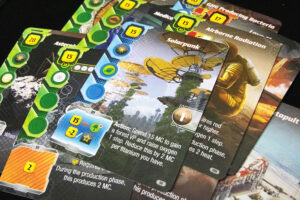
The biggest change is how the actions themselves take place. Borrowing heavily from Race/Roll for The Galaxy, each round begins with players choosing one of the five phases that they would like to execute. If any player chooses a phase, all players will get to take that action. If any phases are chosen by no players, they are skipped entirely. Players do get a small bonus during the phase that they chose. Let’s quickly outline the phases of the round:
- Development – Play a green card. You get a discount if you chose to activate this phase.
- Construction – Play a red or blue card. If this is your chosen phase you can draw a card or place a second card.
- Action – Activate as many of your cards as you wish. You can also perform standard actions any number of times. Players choosing this can activate one card twice.
- Production – Gain money, cards, heat, and greenery based on your production levels. Gain 4 ME if you chose this phase.
Then the game continues in this manner, choosing what to activate and performing all active phases over and over until Mars is ready for us humans to come live.

Game Experience:
I’m a big fan of Terraforming Mars. Especially when you add in drafting and the Prelude expansion to speed things up a bit, it’s a fantastic game. I’m also a fan of _____ for the Galaxy, especially Roll. Ares Expedition is a good game that is a mashup of both of those things. But it somehow doesn’t manage to be as good as either of them. Which leaves it a bit without a home—on Earth or Mars.
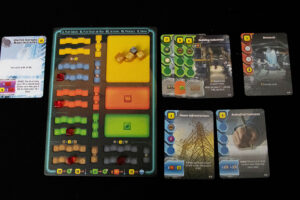
Most folks coming at this game from Terraforming Mars might appreciate that it gives the same feeling in a shorter amount of time. And in some respects, it does. But it really depends which parts of the original game really draw you in. If it’s racing people for milestones, tossing asteroids at them, or building your city right next to their greenery tile… you might be disappointed here. Ares Expedition is entirely multiplayer solitaire. And while I don’t necessarily mind that at times—I’m certainly torn on take-that type cards in strategy games—but removing all sense of caring about what other corporations are doing on this red planet just makes the game feel a bit more like a spreadsheet and less of an exploration of a new world.
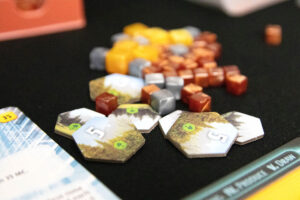
Now if you really just love engine building and card combos, Ares certainly has that in spades. Over 200 cards all with art that is much improved over the clip art disaster this is Terraforming Mars. Unfortunately, there is no drafting or real card selection in Ares Expedition so it’s a bit more of having to make the best out of the cards you happen to draw than getting much input in the selection process. So, while you certainly do end up with an engine of sorts it often feels very loosely tied together rather than a well-executed plan. That, I suppose, is to be expected in a shorter game with fewer ways to score points.
Ultimately, I also don’t think it’s that much shorter. Now people’s idea of a “long” game varies wildly. But if you’ve got Terraforming Mars down to two and a half hours or so (and you should be using Prelude, obviously) you might save yourself about an hour playing Ares Expedition. It’s obviously shorter but personally, I’m just not that sensitive to game length when I’m invested in the experience. And if you do want a shorter game like Ares Expedition, Roll/Race for the Galaxy exists and is even shorter.
Final Thoughts:
Is Ares Expedition a bad game? Of course not. It’s just a mashup of two better games that loses all the things that make either of the other games great. And I hate judging a game simply by comparing it to other games. It’s obviously its own game, but in this case there really isn’t much to set it apart from its inspirations. Maybe it’s ultimately just missing some curveball to really make it stand on its own.
If you haven’t played many games where players simultaneously select their actions and you love Terraforming Mars, you certainly might want to give this a shot. If you love Terraforming Mars and Race for the Galaxy already and you are hoping this combination is the peanut butter and jelly of your board gaming dreams? Well, I found Terraforming Mars: Ares Expedition to be lacking and expect many others will as well.
Final Score: 3 Stars – A good riff on Terraforming Mars using simultaneous action selection that is surpassed by the games it’s inspired by.
 Hits:
Hits:
• Lots of different cards to build your engine with.
• KS edition has sweet dual layered boards, and the card art is solid.
Misses:
• Incredibly solitaire with no drafting, milestones, or tile placements.
• Feels like a worse version of two different games.










